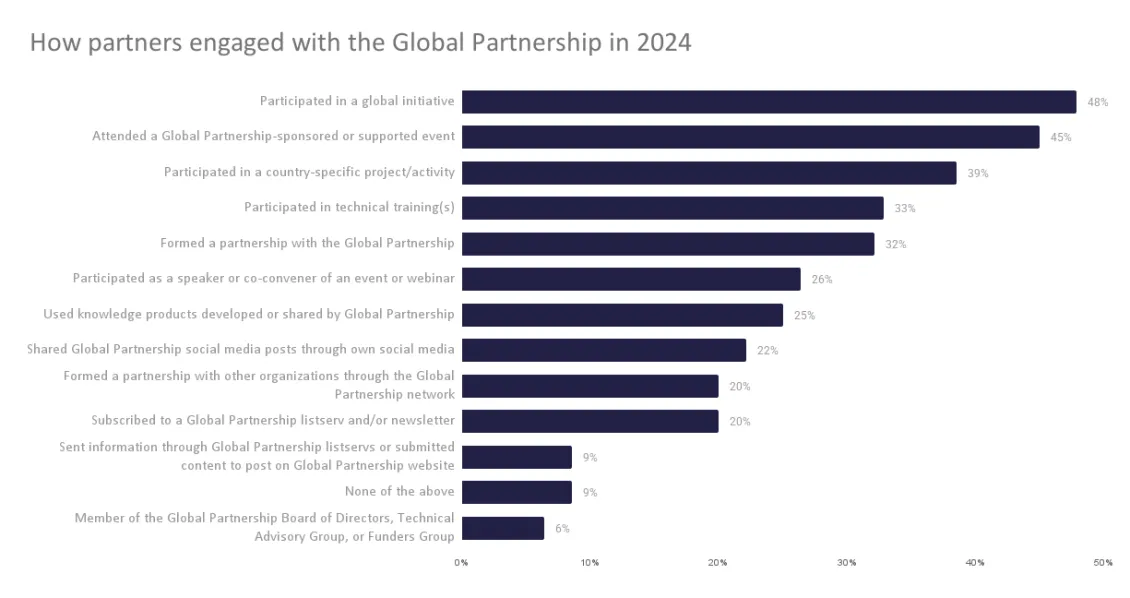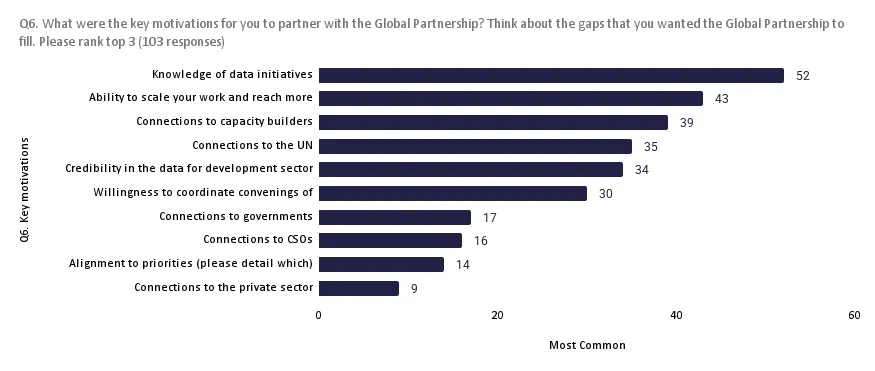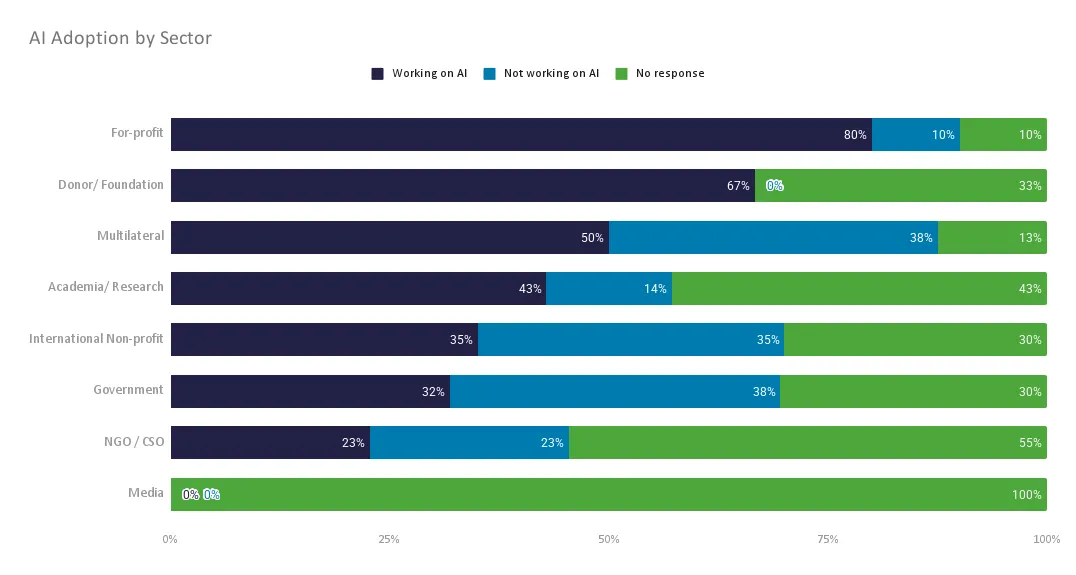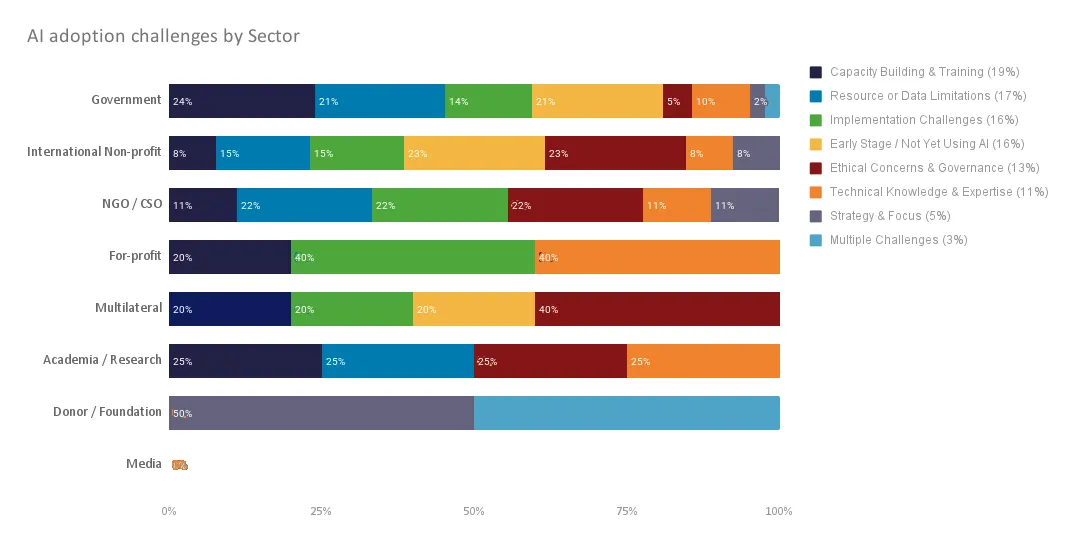What drives a global network of 700+ organizations across government agencies, civil society, academia, and the private sector to collaborate on data for sustainable development? How has this collaboration evolved as data science and artificial intelligence transform our approach to data? Insights from our latest Global Partnership Annual Partners’ Survey provide compelling answers to these questions.
Since 2018, we've conducted this annual survey to understand how partners engage with our network, what they value most, and where we can improve. This year, we received 140 responses from partners across eight sectors and all global regions, with government agencies (49 percent), non-government organizations (NGOs) and civil society organizations/CSOs (16 percent), and international non-profits (14 percent) comprising the majority of respondents.
Four key trends emerged in the survey results, providing continued validation for the direction set in our 2024-2030 Strategy.
The Global Partnership's ability to make data on top of their work has created a lot of knowledge and interest on sustainability and this makes the organization … an agenda-setter on data issues.
- Academia / Research Partner.
Stronger partnerships delivering greater impact

In 2024, we brokered 21 partnerships delivering technical solutions to address country challenges, testing new methods and approaches across over 16 countries in Africa, Europe, and North and South America. With 85 percent of partners reporting successfully achieving their goals through the network (a 9 percent increase from last year), 82 percent feeling pride in their association with the network, and 78 percent feeling empowered to connect and collaborate with others in the network, our partners’ feedback validates our 2024-2030 strategy's emphasis on our role as a coalition builder that works "within multilateral processes and forges new alliances to create well-funded, well-governed, and modern data and technology ecosystems." We saw a 16 percent increase in partners reporting that the Global Partnership helped them achieve something they couldn't have done alone (82 percent), which speaks to the power of our network approach.
The Global Partnership has played a great role in linking us to other important institutions and partners within and outside the government. This has made our processes and outputs more inclusive and therefore more valuable and impactful.
- Government Partner
Evolving engagement priorities

Capacity building has emerged as the primary driver of partnership—a shift that reflects our role as a learning convenor. Partners consistently emphasize the value of learning opportunities, with two-thirds reporting increased knowledge on data for development topics. To meet diverse learning needs, our 2024-30 Strategy introduces three interconnected learning models: experiential, transformational, and self-directed. These models are already in action—from supporting 17 data science fellowships in government and social impact organizations across Africa through the Capacity Accelerator Network, to strengthening data science capacity, driving digital transformation, and reinforcing national statistical systems in Ghana, to supporting the enhancement of local capabilities in using Earth observation (EO) data for environmental monitoring in Suriname, to name a few. Across our initiatives, we remain focused on enabling our partners' transformative journeys by fostering strategic collaborations, peer learning, and tailored capacity-building efforts that expand their ability to improve data availability and promote statistical innovation.
Through opportunities to speak and participate in events, we've certainly gained more exposure, which has helped us to become more known in the field around data values, inclusive data etc.
- International Non-Profit Partner.
The AI transformation
Perhaps the most striking finding is the 20 percent increase in AI adoption among partner organizations, rising to 54 percent, with applications spanning capacity building, decision-making support, AI governance and ethics, and sector-specific uses. This rapid technological transformation underscores the urgent need for our role as a solutions broker. Anticipating this shift, our strategy commits to delivering change through fostering national and regional data and technology partnerships across our network to increase the accountable use of inclusive and timely data and technology across sectors. A prime example of how we are helping shape national pathways for responsible AI adoption is our role in supporting the development of Kenya’s Artificial Intelligence Strategy for 2025–2030, launched by the Ministry of Information, Communications, and Digital Economy.

Despite its potential, AI raises ethical challenges related to privacy, algorithmic fairness, and equitable access to technologies. It is essential to ensure that AI solutions are inclusive and designed in collaboration with local communities.
- Government Partner
The survey also revealed that adoption varies significantly by sector with partners identifying key challenges such as technical capacity, resource constraints, and ethical concerns. As AI adoption among our partners accelerates—alongside the growing momentum around global frameworks like the Global Digital Compact—we recognize that high-level commitments must be grounded in local realities, data systems, and inclusive governance. We stepped up to help bridge that gap with our 2024 AI for Inclusive Development webinar series, a platform for discussing real-life production and applications of AI and related technologies, and are currently working with the network to co-develop a dedicated organizational strategy for our engagement on AI and emerging technologies.

Work is already underway to utilize AI technology to connect our diverse network and improve access to knowledge resources, learning materials, and networking opportunities. With two-thirds of survey respondents indicating they would use such a tool, we hope to directly address partners' expressed needs for easier discovery of relevant content while aligning with our self-directed learning model.
Shifting regional dynamics
Latin America and the Caribbean (LAC) representation in survey responses surged from 17 percent to 45 percent, demonstrating our success in expanding our network to new regions while maintaining strong connections in Sub-Saharan Africa (36 percent). This geographic diversity is critical to our mission to bring organizations together to work toward our common aims and scale our impact across regions. Our expanding engagement in LAC is reflected in both new initiatives, such as LGBTIQ+ data in Latin America and the Caribbean, which convened over 300 stakeholders from more than 16 countries to shape a regional agenda for LGBTIQ+ statistical standards in 2024, and has successfully influenced regional approaches to LGBTIQ+ data collection, earlier efforts like our initiative on Unlocking Privately-Held Data for Good, which led to a groundbreaking legal framework in Uruguay for accessing privately-held data and is influencing data governance practices across LAC, and Paraguay’s Water Information System, which is now helping target water and sanitation projects in underserved communities using real-time data.
Alone we go fast, but together we go far... our quote often used to describe the strength of collaboration.
- For-Profit Partner in Latin America and the Caribbean.
Looking ahead: The Power of Data
Another powerful insight from our survey transcends technological metrics. It's about human connection, shared learning, and collective progress. Our partners don't just see us as a network—they view us as a collaborative platform for meaningful change.
The Global Partnership’s myriad actions help bring a 'glue' to the ecosystem and ensure a strong flow of ideas and collaboration.
- Donor/Foundation Partner.
Enter: The Power of Data High-Level Initiative. The Power of Data stands as a testament to the transformative potential of collaborative data ecosystems. In 2024, we catalyzed national data partnerships across 12 countries. From Somalia’s commitment to collecting 100 percent of Tier 1 SDG indicator data by the end of 2025, to the Dominican Republic's progress on a comprehensive statistics act, we're seeing real-world transformation at national and international levels. Our survey results and the appetite for participation in the Power of Data initiative stand testament to the fact that sustainable development demands collaborative, context-specific approaches that empower local stakeholders.
As we continue to evolve as a network, we welcome you to get involved and join our mission. Together, we can build data ecosystems that are:
- Inclusive and equitable
- Technologically advanced
- Responsive to local needs
- Aligned with global Sustainable Development Goals.
If you'd like to learn more about joining our network and collaborating to solve today's most pressing challenges using data, please reach out to our Partner Network Associate, Julia Nicolls, at [email protected].

